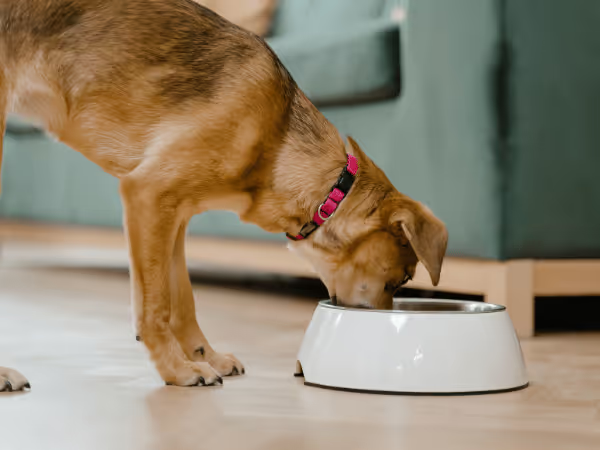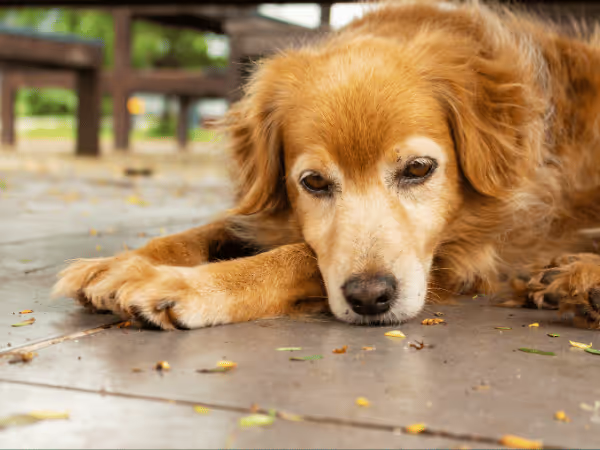Your dog’s poop offers valuable clues about their health. If you notice diarrhea in your dog, it could be caused by a variety of factors, including eating something they shouldn’t, infections, inflammatory bowel disease (IBD), colitis, and more.
In this Sploot Vets guide, we’ll explore the common causes of diarrhea in dogs:
1. Dietary Indiscretion & Garbage Gut in Dogs
Dogs are notorious scavengers and may eat garbage, spoiled food, human food scraps, or foreign objects, which can lead to gastrointestinal issues. This is often referred to as dietary indiscretion, garbage gut, or garbage toxicosis in dogs.
The toxins and bacteria that dogs ingest can irritate their gastrointestinal tract, disrupt the balance of gut bacteria, and lead to acute diarrhea, vomiting, or other complications.
2. Sudden Changes in Dog Food
Switching dog food too quickly can disrupt the balance of gut bacteria in your dog’s stomach or expose them to ingredients that they don’t tolerate well. This can cause your dog to experience acute diarrhea. For this reason, vets recommend a gradual approach.
Sploot veterinarian Dr. Sylvia Berns recommends the following when transitioning to new dog food to help minimize gastrointestinal issues:
- First 1 - 2 weeks = 90% old food + 10% new dog food
- Next 1 - 2 weeks = 80% old food + 20% new dog food
- Next 1 - 2 weeks = 70% old food + 30% new dog food
- So on and so forth until the new dog food is completely weaned in.

3. Hot Temperatures
Hot temperatures can lead to acute diarrhea in dogs by causing heat stress or heat exhaustion, which disrupts gut function. Overheating triggers inflammation and changes in intestinal motility, leading to diarrhea, especially in dogs that are overexerted or left in hot environments.
4. Intestinal Parasites in Dogs
Intestinal parasites, such as Giardia and intestinal worms in dogs (e.g., roundworms, hookworms, and whipworms), are common causes of chronic or recurring diarrhea. Puppies and shelter dogs are particularly vulnerable, highlighting the importance of regular vet visits, preventive care, and good hygiene.
5. Infections
Infections can cause diarrhea in dogs locally or systemically. Here’s how:
- Gut infections (local)– Certain infections directly affect the dog’s gut; a few common examples include parvovirus, Salmonella, E.coli, and Giardia.
- Widespread infections (systemic) – Some infections cause systemic complications in the body, potentially resulting in acute diarrhea (among other symptoms), due to toxins or inflammatory reactions. A few examples include leptospirosis, canine distemper, and sepsis.

6. Food Intolerances or Allergies in Dogs
Some dogs are intolerant or allergic to specific proteins (like chicken, beef, or seafood); these are the most common causes of food allergies in dogs. In rare cases, dogs can also be sensitive to grains, dairy, and other plant-based ingredients.
These intolerances or food allergies can trigger chronic diarrhea in dogs, as well as other symptoms, such as itching and increased shedding.
7. Infectious, Inflammatory, & Stress Colitis in Dogs
Colitis in dogs is an inflammation of the colon (large intestine) that leads to symptoms such as frequent, small-volume diarrhea, often accompanied by mucus or blood. There are three main causes of colitis in dogs:
- Stress colitis in dogs – This condition is often caused by anxiety or stress resulting from new environments, dog boarding, fireworks, or visits to clinics that don’t provide Fear Free veterinary care.
- Infectious colitis in dogs – This is caused by certain parasites and bacteria, like whipworms and Clostridium.
- Inflammatory colitis in dogs – This can be caused by allergies, autoimmune disorders, and inflammatory bowel disease in dogs.
8. Other Medical Conditions
Aside from colitis, other medical conditions can also cause diarrhea in dogs, though they tend to be less common than colitis. These include:
- Pancreatitis in dogs – Inflammation of the pancreas disrupts enzyme production needed for digestion, resulting in fat malabsorption, nausea, and loose, greasy diarrhea in dogs.
- Liver disease – The liver plays a crucial role in digesting fats and filtering toxins; when this organ is impaired by disease, bile flow is affected, and toxins may accumulate, leading to gastrointestinal upset and chronic diarrhea in dogs.
- Kidney disease – Kidney disease leads to a buildup of toxins in the body, which can irritate the digestive tract and disrupt electrolyte balance, resulting in chronic diarrhea in dogs. In addition, certain medications for kidney disease can further aggravate gastrointestinal upset.
9. Age-Related Causes of Diarrhea in Dogs
Your dog’s age can influence the most likely causes of diarrhea. This is especially applicable to puppies and senior dogs.
a. Senior Dog Diarrhea
Senior dog diarrhea can be caused by age-related conditions such as organ dysfunction (kidney or liver disease), inflammatory bowel disease, or even cancer. Older dogs may also be more sensitive to dietary changes, stress, or medications, all of which can upset their digestive system.
b. Diarrhea in Puppies
Puppies often develop diarrhea due to parasites, dietary indiscretion, stress, or viral infections like parvovirus, which can be life-threatening. Their immature immune systems make them more vulnerable to digestive upset from a wide variety of triggers.

When to Seek Veterinary Care for Diarrhea in Dogs
If your pet experiences severe or persistent diarrhea (lasting more than 12 hours), we recommend consulting a veterinarian for appropriate treatment. Diarrhea can be a symptom of various health issues, and early diagnosis and intervention are crucial for your dog’s health.
Sploot Vets: Your All-in-One Vet for Dogs
Is your dog suffering from diarrhea? Sploot Vets provides all-in-one veterinary care you can count on. We offer primary care, urgent care, and emergency vet services all under one roof! Visit our clinics in Denver, Chicago, and Colorado Springs, open for extended hours, 365 days a year.
For urgent care concerns (such as persistent diarrhea in dogs), call our team at (720)770-8656
If you’d like to schedule a regular check-up, you can easily book an appointment online or through the Sploot Vets app.






